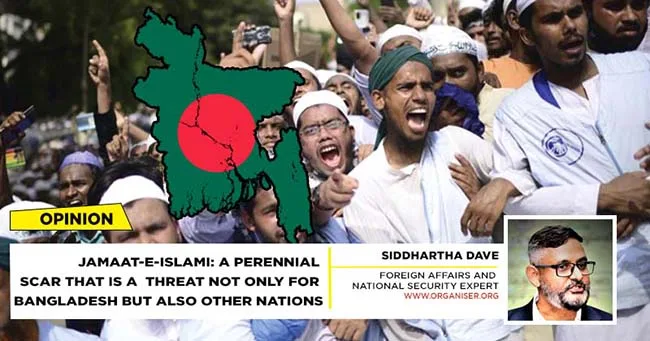Jamaat-e-Islami’s role in the 1971 Bangladesh Liberation War remains one of the most controversial and painful episodes in the nation’s history. As Bangladesh fought for its independence from Pakistan, Jamaat-e-Islami sided with the Pakistani military, suppressed the liberation movement and participated in a series of atrocities that have left a lasting scar on Bangladesh. This article explores the war crimes committed by Jamaat-e-Islami during the conflict, drawing from tribunal reports and post-liberation committee findings.
Contours of the Liberation War
In 1971, East Pakistan (now Bangladesh) sought independence from West Pakistan due to long-standing economic, political and systemic cultural discrimination. The struggle culminated in a brutal conflict, with the Pakistani military launching Operation Searchlight on March 25, 1971, aimed at suppressing the independence movement. What followed was a nine-month war marked by widespread atrocities including mass killings, rapes and the displacement of millions.
During this period, Jamaat-e-Islami emerged as a staunch opponent of Bangladesh’s independence. The party aligned itself with the Pakistani military, motivated by its ideological commitment to preserving the unity of an Islamic Pakistan. Jamaat leaders viewed the independence movement as a threat to Islamic unity, concept of Ummah and actively collaborated with the Pakistani military to suppress it.
Jamaat-e-Islami played a crucial role in the formation of paramilitary forces that assisted the Pakistani military in carrying out atrocities against the Bengali population. The two most notorious of these groups were the Razakars and Al-Badr, both of which were directly involved in war crimes
- Razakars: The Razakars were a volunteer militia formed by the Pakistani military, with absolute backing from Jamaat-e-Islami. They were responsible for mass killings, looting, arson, and the persecution of pro-independence activists and minority communities, particularly Hindus
- Al-Badr: Al-Badr, primarily composed of members from Jamaat’s student wing, Islami Chhatra Sangha, was involved in the systematic abduction, torture, and execution of intellectuals and professionals in the final days of the war. This massacre of intellectuals, known as the “Intellectual Genocide,” was aimed at crippling the future of an independent Bangladesh by eliminating its brightest minds
Holding Jamaat Accountable
In the years following independence, Bangladesh grappled with the legacy of the war and the atrocities committed by collaborators. The calls for justice grew louder, culminating in the establishment of the International Crimes Tribunal (ICT) in 2010. The ICT was tasked with investigating and prosecuting those responsible for war crimes during the 1971 Liberation War. Several high-ranking leaders of Jamaat-e-Islami were tried and convicted by the ICT for their roles in the atrocities:
- Ghulam Azam: The former leader of Jamaat-e-Islami, Ghulam Azam, was found guilty of five charges, including conspiracy, planning, incitement, and complicity in war crimes. He was sentenced to 90 years in prison. Azam was a key figure in the collaboration with the Pakistani military and was instrumental in forming the Razakars
- Motiur Rahman Nizami: As the head of Al-Badr, Motiur Rahman Nizami was convicted for his involvement in the killings of intellectuals and other war crimes. He was sentenced to death and executed in 2016. Nizami’s role in the execution of Bangladesh’s intellectuals was particularly heinous, as it sought to destroy the nation’s cultural and intellectual heritage
- Ali Ahsan Mohammad Mujahid: Another leader of Jamaat, Mujahid, was the secretary-general of Al-Badr and was also sentenced to death for his role in the mass killings of intellectuals. He was executed in 2015
The ICT’s proceedings have been both lauded and criticised. Supporters argue that the trials were necessary for delivering justice to the victims and their families, and for bringing closure to a painful chapter in the nation’s history. Critics, however, have raised concerns about the fairness of the trials, the adequacy of legal representation for the accused and the perceived political motivations behind the tribunal.
The crimes of Jamaat-e-Islami during the 1971 Liberation War were well-documented by various committees and reports established after Bangladesh gained independence. One of the earliest efforts to document the atrocities was undertaken by the People’s Inquiry Commission, formed shortly after liberation. The commission compiled extensive evidence of war crimes, including testimonies from survivors, which were later used in tribunal proceedings. In addition, the 1972 Collaborators Act was enacted to bring those who had collaborated with the Pakistani military to justice. However, political instability and subsequent Government changes led to a delay in prosecutions, allowing many accused individuals to escape justice for decades.
Darkest Chapter in History
The involvement of Jamaat-e-Islami in the 1971 atrocities has left an indelible mark on Bangladesh’s political and social landscape. The party’s role during the war is a source of deep-seated anger and mistrust among many Bangladeshis, particularly the families of the victims. Despite its attempts to rebrand itself as a legitimate political entity, Jamaat’s wartime actions continue to haunt its image. The war crimes trials have also had significant implications for Bangladesh’s political environment. While the trials have provided some measure of justice, they have also deepened political divisions, particularly between Jamaat and its allies and the ruling Awami League.
The war crimes committed by Jamaat-e-Islami during the 1971 Liberation War stand as one of the darkest chapters in Bangladesh’s history. The atrocities carried out by Jamaat-affiliated militias like the Razakars and Al-Badr, under the party’s ideological and logistical support, were brutal and calculated, aiming to crush the independence movement and terrorise the population. The subsequent trials by the International Crimes Tribunal have brought some perpetrators to justice, but the scars of these crimes remain deeply etched in the national consciousness.
As Bangladesh continues to grapple with its past, the story of Jamaat-e-Islami serves as a reminder of the devastating consequences of ideological extremism and the importance of upholding justice and accountability in the face of such horrors.




















Comments